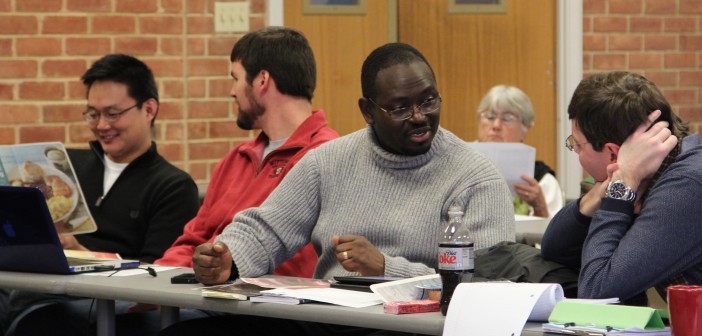As soon as I saw the television images of Mother Emanuel African Methodist Episcopal (AME) Church in Charleston on the early morning news, my heart sank. The caption below said nine people had been killed, and soon there appeared the picture of the church’s pastor, my friend and student the Reverend Clementa Pinckney, one of the victims. This cannot be happening! People gunned down at a Wednesday night prayer meeting and Bible study, a weekly tradition across the South and elsewhere for generations now carried on by churches such as Emanuel. But it was true, and the reality of this unbelievably tragic event began to sink in.
The reactions of the people of Mother Emanuel during and after this horrible event demonstrate to the world what it means to live according to one’s beliefs, even when confronted with such unthinkable evil.
Clementa Pinckney was called to ministry as a young teenager and soon began his expansive ministry. He pursued ordination in the AME Church, a powerful force in his home state of South Carolina both in numbers and impact. He was elected to the state House of Representatives at 23. Four years later he was elected to the State Senate where he still served at the time of his death. He was equally at home with the most humble and the most powerful of people, both of whom he encountered almost daily.
Yes, the future was virtually unlimited for a man of his character, ability, and experience. However, there is another story of promise that needs to be told. It is reflected in the witness of a congregation, nine victims, and their families. You see, most people view this incident through the lens of race relationships rather than Christian witness. Racial hatred, we are now told, caused the tragedy, but the reactions of the people of Mother Emanuel during and after this horrible event demonstrate to the world what it means to live according to one’s beliefs, even when confronted with such unthinkable evil.
Welcoming the stranger. When I learned that the shooter had spent an hour with the group before the attack, I knew immediately how he had been received. As one of the family members said to him in court a few days later, “We welcomed you with open arms to our Bible study.” That Wednesday evening Mother Emanuel Church and its members displayed the biblical witness of hospitality, as they have for generations. In fact, it is reported that the accused shooter said afterward that for a moment he considered not carrying out his deadly intentions because the people had treated him so well. I know that is how my friend Clem welcomed him — and everyone who came into his presence. A litany used across AME churches on the Sunday after the deaths repeated the phrase — “The doors of the church are still open.”
Forgiveness. If hospitality set the stage, forgiveness demonstrated that their faith was the real thing. The forgiving spirit of the families of victims and church members is a reflection of the church’s embodiment of a central component of Christian witness. While the world reacted with amazement and surprise at their forgiving spirits, such a response would be expected from those closest to the church, including younger people. It was the spirit they had seen in their pastor.
Public service and the common good. The African American church embodies what at one time was more prevalent across all churches, a strong identification with their communities and a concern for the common good of all. The tradition of a pastor serving in public office, as Clem did, is not unusual in the African American tradition, and active engagement with public affairs by clergy and lay leadership is even more common.
Humility. Virtually everyone who has spoken of their relationship with Clem Pinckney has spoken of his humility. He had so many claims to fame, yet one would never know it from his personal interactions with others. Gates, who interviewed him some years ago for a PBS documentary, called him “quietly impressive.” He was such a dear and caring person. His life was extraordinarily complicated and busy given all of his commitments. However, he never failed to give each person the respect and attention they needed.
Clem and those with him at the Bible study knew God as their refuge and strength, a very present help in trouble. So in the spirit of the psalmist they did not fear. In fact, accounts of what transpired in that church meeting room reveal that the victims faced danger with bravery and acts of self-sacrifice. Continuing in the language of Psalm 46, they knew that God was in the midst of the city just as Mother Emanuel had been for so long and that, despite whatever happens, God will be there when the morning dawns.
The Lewis Center for Church Leadership and the entire Wesley Theological Seminary community join the nation in mourning the loss of our student, the Rev. Clementa C. Pinckney, Jr., and the other eight victims of the Charleston tragedy as we continue to pray for healing, reconciliation, and justice.
The Rev. Clementa Pinckney was enrolled in the Wesley Doctor of Ministry program in church leadership where Dr. Weems was his teacher and adviser. Pastor Pinckney had completed his course work and was working on his project and thesis on the tradition of bi-vocational ministry in the African American church tradition. At the start of the Fall 2015 semester, the faculty at Wesley unanimously voted to posthumously award Clementa his D.Min at Wesley’s 2016 commencement ceremony.
Related Resources:
- Starbucks, Communion, and Race Conversations by F. Douglas Powe, Jr.
- Nelson Mandela — A leader for His Time by Lovett H. Weems, Jr.







